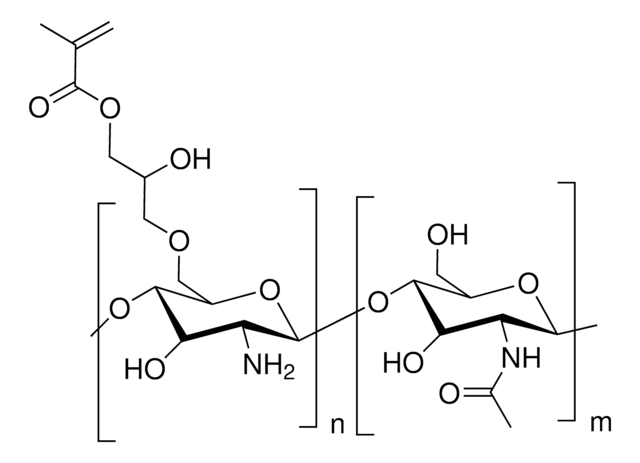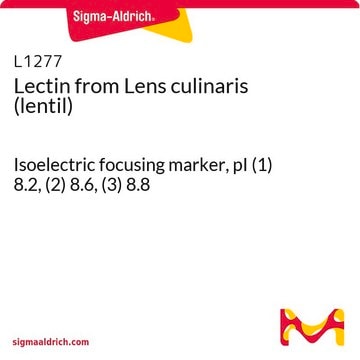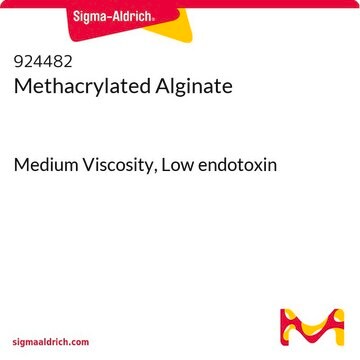Alle Fotos(1)
Wichtige Dokumente
934798
Gelatin acrylate
gel strength 300 g Bloom, degree of substitution 60%
Synonym(e):
Gelatin acrylate, Acrylated gelatin
Anmeldenzur Ansicht organisationsspezifischer und vertraglich vereinbarter Preise
Alle Fotos(1)
About This Item
Lineare Formel:
(C40H59N11O13)n
UNSPSC-Code:
12352202
NACRES:
NA.21
Empfohlene Produkte
Verwandte Kategorien
Allgemeine Beschreibung
Gelatin is a natural biopolymer derived from collagen that plays an important role in the biomedical field due to its biocompatibility, biodegradability, and nonimmunogenicity. Acrylate-functionalized gelatin, or gelatin acrylate, can be crosslinked using thiol-Michael click chemistry as well as photochemical crosslinking. It′s properties are very similar to gelatin methacrylate (GelMA). Crosslinked gelatin hydrogels have many applications in tissue engineering and 3D bioprinting.
Anwendung
- Endothelial cell morphogenesis
- Injectable tissue constructs
- Tissue engineering of multiple tissue types including heart tissue (cardiomyocytes), bone tissue (osteogenesis), cartilage tissue (chondrogenesis), and epidermal tissue
- Drug delivery applications including contact lens and dental
Leistungsmerkmale und Vorteile
- Photopolymerizable
- Clickable
- Biocompatible
- Biodegradable
Ähnliches Produkt
Produkt-Nr.
Beschreibung
Preisangaben
Lagerklassenschlüssel
11 - Combustible Solids
WGK
WGK 1
Flammpunkt (°F)
Not applicable
Flammpunkt (°C)
Not applicable
Hier finden Sie alle aktuellen Versionen:
Analysenzertifikate (COA)
Lot/Batch Number
Leider sind derzeit keine COAs für dieses Produkt online verfügbar.
Wenn Sie Hilfe benötigen, wenden Sie sich bitte an Kundensupport
Besitzen Sie dieses Produkt bereits?
In der Dokumentenbibliothek finden Sie die Dokumentation zu den Produkten, die Sie kürzlich erworben haben.
Hongyuan Zhu et al.
Journal of the mechanical behavior of biomedical materials, 88, 160-169 (2018-09-03)
Biocompatible hydrogels with defined mechanical properties are critical to tissue engineering and regenerative medicine. Thiol-acrylate photopolymerized hydrogels have attracted special interest for their degradability and cytocompatibility, and for their tunable mechanical properties through controlling factors that affect reaction kinetics (e.g.
Xin Zhao et al.
Advanced healthcare materials, 5(1), 108-118 (2015-04-17)
Natural hydrogels are promising scaffolds to engineer epidermis. Currently, natural hydrogels used to support epidermal regeneration are mainly collagen- or gelatin-based, which mimic the natural dermal extracellular matrix but often suffer from insufficient and uncontrollable mechanical and degradation properties. In
Kelly M C Tsang et al.
Advanced functional materials, 25(6), 977-986 (2015-09-04)
Hydrogels are often employed as temporary platforms for cell proliferation and tissue organization in vitro. Researchers have incorporated photodegradable moieties into synthetic polymeric hydrogels as a means of achieving spatiotemporal control over material properties. In this study protein-based photodegradable hydrogels
Chaenyung Cha et al.
Biomacromolecules, 15(1), 283-290 (2013-12-19)
Microfabrication technology provides a highly versatile platform for engineering hydrogels used in biomedical applications with high-resolution control and injectability. Herein, we present a strategy of microfluidics-assisted fabrication photo-cross-linkable gelatin microgels, coupled with providing protective silica hydrogel layer on the microgel
Aleksander Skardal et al.
Tissue engineering. Part A, 16(8), 2675-2685 (2010-04-15)
Bioprinting by the codeposition of cells and biomaterials is constrained by the availability of printable materials. Herein we describe a novel macromonomer, a new two-step photocrosslinking strategy, and the use of a simple rapid prototyping system to print a proof-of-concept
Unser Team von Wissenschaftlern verfügt über Erfahrung in allen Forschungsbereichen einschließlich Life Science, Materialwissenschaften, chemischer Synthese, Chromatographie, Analytik und vielen mehr..
Setzen Sie sich mit dem technischen Dienst in Verbindung.






